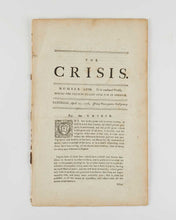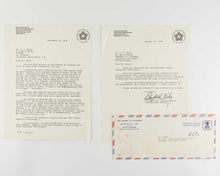[MOORE, William.] The Crisis … During the present bloody Civil War in America. [Printed and published for the authors, by T. W. Shaw, in Fleet-Street, opposite Anderton’s Coffee House, where letters to the publisher will be thankfully received]. 1776.
Small folio. Disbound, three leaves tipped together; pp. [425]-430; the text begins with an ornately printed 'T' encased within the Latin motto 'Auro Libertas Pretiosior' - freedom is more precious than gold; together with 1970s correspondence American Revolution Bicentennial Administration about the item; remnants of binding to spine; light even discolouration; small, unobtrusive marginal hole running through all leaves; a very scarce late 18th century political pamphlet.
First edition of number LXVII of The Crisis. The two letters alongside the pamphlet are addressed to A. J. Major, and dated 1976. They are from the International Affairs department of the American Revolution Bicentennial Administration, and describe where other copies of this publication can be found in American libraries, and how much copies of the pamphlet were worth at that time. The Crisis was a weekly pamphlet, published anonymously, between January 1775 and October 1776, 'to be continued weekly, during the present bloody civil war' (text). The authors published their political writings in an attempt to join Britain and the American colonies in a transatlantic community of protest against British colonial rule, condemning the British imperial policy as self-destructive and its treatment of the Americans as shortsighted. The authors never publicly declared themselves, though the publications have been attributed to William Moore, as he was the author behind a similar weekly The Whisperer, started in 1770. The third issue was not well received by both the House of Commons and the House of Lords, and was consequently publicly burned in March by the hangman in 1775 at the Old Palace-yard and the Royal Exchange, which was met with public distaste. Throughout the series, the authors emphasised that the press had to be free and uncensored because only the press could be trusted to report on the truths of the British imperial activities (see York, George III, Tyrant: The Crisis as Critic of Empire, 1775–1776).
In this, the sixty-seventh issue, the authors write: "it may therefore be of service to the world, to shew what measures have been taken by corrupt ministers, to ruin and enslave the people over whom they presided; and to shew by what steps and gradations of mischief nations have been undone, and consequently what methods may be hereafter taken to undo others."
ESTC P232 (91 issues; 'Reprinted in London and in the American colonies, with individual issues appearing as octavo pamphlets … Includes strident attacks on Lord North’s ministry for his North American policies; laments the political defeat of William Pitt'); Sabin 17514 ('of great rarity, contains a remarkable collection of papers attacking the ministry and the British government in terms of the greatest severity').
#2113744




